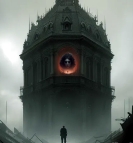The Braeburn Report
By Babs Yerunkle
March 3, 2006
We met “by chance” in the back room of Trufant’s. The famous restaurant had a slump between 2 and 4 PM, so it was nearly empty. It was also above the price range of most people in the Office, so we were unlikely to be spotted by co-workers.
I ran a hand up my bald scalp, pretending that I was shocked to spot my one-time associate. When Dr. Arendt had first joined the MCO, I’d been his mentor.
“Peter!” I called softly, feigning surprise. “How unexpected, running into you here! I was planning to eat alone, but…”
“Dr. Braeburn! So was I,” he replied. “But I wouldn’t mind reminiscing about old times.”
We sat down at the most hidden table, and placed our cell phones at the opposite ends of the table. Both of us had anti-eavesdropping upgrades. Mine was Office-standard, 06Q1 upgrade. Peter, with his inheritance, had purchased an independent package off the black market. With dual protection in place, I leaned back a little more comfortably.
“That’s better. I hate to get all paranoid,” I leaned back in my seat wearily “but these last few years at the Office…”
“It hasn’t been much better down in my division,” Peter revealed. “How are you doing, Stephen? You’re closer to the top of research. And ever since Loman took over…”
“It isn’t Loman’s fault,” I told him firmly. “Perhaps not Loman’s credit, either. He makes a good sergeant, but he’s not the lieutenant, if you catch my drift.”
“I’m afraid I don’t,” Peter said, slightly puzzled.
“Loman’s a good soldier,” I said. “He carries out his orders faithfully and with great efficiency. But he’s no good at policy. He sees his job as following orders and nothing more.”
“So… who? Are you saying that everything’s because of Piet von der Geest?”
I winced. “Can we avoid naming names? I’m hoping our precautions are sufficient, but modern speech-recognition software can pick a phrase like that out of the air.”
Peter’s eyes went wide, then he nodded. “So you’re saying that our esteemed director…?”
“Yes. You have to remember that the … person in question … is an Afrikaner of the old school. He’s seen how minor genetic differences can divide a culture and tear it into pieces. In many cases a mutation is a trivial difference. Some people might think that norms and mutants could live alongside one another. Others think that there can never be peace until once side is unquestionably supreme, and rules the other side with an iron fist. Due to certain childhood experiences, our director takes the second opinion.”
“I… see.” Peter had a worried look in his eye. “Is that going to cause trouble for me?”
“Why would it? You’re not a mutant any more than I am.”
“No, but I am a mutophile. Everyone in my section knows it.”
I sighed. “Peter, I warned you to keep your perversions to yourself.”
“But how can I help it? It’s just about the sexiest thing you can imagine! Think of it – some ordinary boy, victim of forces we barely understand, transformed into a beautiful young girl. There she is, like a newly opened blossom, confused, worried, insecure. She has no understanding of her own sexuality or needs – until the right man comes along with sympathy and knowledge and takes on the task of teaching her the mystery and wonder of her own body. He must train her to dress, and walk, and talk, and act. And instruct her in the arts of lovemaking.”
“You don’t want a mutant girl,” I told him, “You want Eliza Doolittle, with you playing the part of Henry Higgins. Do you really get that much of a thrill from My Fair Lady?”
“It’s a bit different,” Peter grumped. “Professor Higgins never instructed his charge in the delicate art of lingerie.”
“Well for God’s sake, show some tact and don’t mention any of this in the office,” I warned.
“A little late for that,” Peter sighed. “Oh, I wasn’t so indiscrete as to mention the full details of my fantasy. But everyone knows that I’m fascinated by the concept of radical mutant transformations, including and especially gender changes.” He gave a quirky laugh. “Can you imagine? I think some of the girls suspect that I myself harbor desires of converting into a woman. They’ve even been dropping hints and details about makeup and the like … just in case. Bit of an office joke.”
“And you don’t…” I let my question trail off distastefully.
“Good heavens, no! I do take notes from the girls, though. Just in case.”
“In case Eliza Doolittle shows up on your doorstep?”
“Exactly.”
Our waitress arrived and we ordered. It was just as well, since I needed some time to settle from Peter’s too-disturbing revelations. That was one of the things I’d tried to do as his mentor – tone down his trust and enthusiasm, as well as his tendency to share too-personal details of his inner lusts.
Alone again, Peter continued, before I could switch us to a less intimate topic.
“Actually, my well-known proclivities have netted me a significant win,” he revealed. “I’ve landed a research project which is, frankly, everything I could ask for.”
I merely quirked an eyebrow in inquiry.
“Well,” he revealed, “you know that there are several notorious cases of male-to-female transforms, or the reverse, in adolescent mutants.”
I nodded, sipping my drink.
“So, I’ve been handed the research task of quantifying that, searching for patterns, trends, triggers, means of control or reversal or stimulation, if possible.”
“Sounds right up your alley,” I admitted.
“It is! I can’t wait!” After a moment, his social graces seemed to awaken once more and he blurted out, “But what about you? Wasn’t there something about you working on some high-priority classified paper?”
“Yes, which I why I sought you out like this, Peter.” He looked utterly confused at that, so I explained. “I heard through the grapevine that your investigation might touch mine, in a peripheral sense. Now that I know the details, I think there may be more overlap than I’d suspected. Peter, what’s the normal policy for working on research?”
“Check all scans and digital data into the server, each Friday. Drafts of the work-in-progress saved to the archive store, daily. That way, if anything happens to you, even if the entire building is destroyed, they’ve got international backups.”
“Exactly.” I rechecked the countermeasures status being monitored by my cell phone. “And I want you to violate that. Keep your paper and notes, but only check in some of the raw data, and the most innocuous elements of the paper.”
“But—why on earth would I do that?”
“The director has often called himself a Boer. Do you know anything about the Boers?” I asked, in an apparent change of subject.
“Not really. Are they from African, or Indonesia?”
“South African. You might call them aristocratic farmers – the descendents of European colonists, mainly Dutch, speaking Africaans. With the discovery of first diamonds and then gold, there was a massive migration into the area, and the British arrived in force. Which led, inevitably, to conflict and then war. They’re called the Boer Wars, and the first was a little before our American Civil War.”
I took another sip of my drink before continuing.
“On one side, you had the Boers – skilled gentleman farmers, all expert hunters wearing khakis and other earth-toned clothes – a sort of natural guerilla army. On the other side, you had regiments of British redcoats, marching in formation and using formal tactics. It was a sniper war, and the British were decimated.
“I mention this, because there are elements that bear some relationship to the tactics the MCO adopts against mutant superheroes. You’ll note that we have a campaign that actively encourages mutants, both heroes and villains, to dress in distinctive high-contrast outfits. Conversely, the MCO’s troops have lower-contrast outfits, camouflage fatigues are standard, and digital camo is the preferred field wear.”
Peter nodded thoughtfully.
“The second Boer war went the other way. It happened right at the turn of the 1900’s. The Boers again adopted their successful guerilla campaign, though the British were a bit smarter. In a way, you could say the Boers won every battle and lost the war. Not quite correct, but there’s a grain of truth to it. They lost about 7,000 troops, while costing the British over three times that many casualties.”
Peter was aghast. “And the British pushed on through that?”
“Well, they had the entire empire behind them, didn’t they? There was the British portion of South Africa, Canada sent troops, as did Australia and New Zealand. There were even units from India. In a sense, you had the might of the world focused against a small group of farmers. The war wasn’t popular in England, but in the end they prevailed. Also, the British had a secret weapon. They invented the concentration camp. Since the guerillas were being supported by the native populace, the answer was to round up the native populace and imprison them – everyone, the entire native populace. The British captured and imprisoned nearly 100,000 Boers, and then kept them in dingy, overcrowded camps with poor sanitation and little food. Over a quarter of the Boers died there, mostly children.
“And again, the MCO has taken lessons from this conflict. We never send out an Intervention Squad or drop ship without making sure that we outnumber the mutants by a factor of at least four to one. Never. And I suspect that the concept of concentration camps looms large in the director’s mind. Either as a tactic that we might use against them, or one that, in other circumstances, they might use against us.”
“I… see. That’s a bit more office politics than I wanted to know,” Peter admitted, eyes wide. “But I don’t see how it relates to my research.”
I smiled, grimly. “Even earlier in South African history was the Battle of Blood River. 10,000 Zulu troops against less than 500 Boers. Early 1800’s. The British were moving into the cape in force, and the previous colonists, largely of Dutch descent, decided they preferred the independent life, so they began the ‘great trek.’ A bit more complicated than that, but that’s the gist of it. The problem: their route led through Zulu territory, and the Zulus objected to the migration through their land. Which is how you had 10,000 Zulu troops facing off against 500 Boers. How do you think it came out?”
“The Boers must have been slaughtered.”
“Let me point out that the Boers had a technological advantage. Single-shot muskets, versus the Zulu spears. Wooden wagons like in an old western, that they could circle into a formation called a laager. That, against the Zulu defense of hide shields.”
“It didn’t do Custer much good, and he had weapons a lot better than muskets.”
“Not quite the same thing. I don’t recall any stories of Custer circling his wagons.”
“Still, the same principle. It must have been a massacre.”
“It was,” I admitted. “The Boers took three casualties. Three wounded, actually. They weren’t fatalities. The Zulus lost 3,000. That’s why it’s called The Battle of Blood River.”
“Good God!”
“And I think that’s the final lesson we need to consider. A small force with superior tactics can completely demolish even a huge force that’s weaker. Think 500 mutants against 10,000 conventional military troops. That’s what really scares the director, I’m sure. Conversely, if we could equip our troops with enough of a technological edge, proper training and coordination… then no mutant force in the world could stand up to us. No conventional force either, when you come down to it. Of course, we’d need some advances in force-field technology, vastly superior rifles, mobility enhancements, and so on. Perhaps power armor.”
“But…” Peter looked around wildly, as if expecting to spot watchers from Internal Affairs. “But I just do research! So do you, for that matter! We’re both statisticians, for God’s sake!”
“True,” I agreed. “My own project is a comprehensive survey of mutation trends within the worldwide population of Homo sapiens. Your report will feed into mine, which is how I became aware of it. Of course, that’s just a euphemism. We aren’t really concerned with the standard mutations like sickle-cell or cystic fibrosis, though we’re surveying that too, to see if there’s a link. Mostly we’re tracking the meta-gene complexes. Any mutation that opens the door to one of the secondary effects – BIT, body-image control, psi activation, and so on.”
Peter shifted uncomfortably. “You seem to be implying that my report may uncover something significant. Some piece of information that we might want to…” his eyes shifted from side to side once more “…control. Or even something to suppress.”
“Let me be frank,” I told him. “People up in my section see your research as something that falls in that gray band between joke and perversion.”
He gulped. The truth is often hard to take. Finally, “But… you don’t?”
“I started my research by collating all data on known and reported mutants. As you know, getting information out of statistical data depends entirely on what question you ask.” We shared a statistician smile. “I stumbled upon a very interesting question. To wit, the relationship between power and GSD.”
“The freaks.”
“There’s a more technical definition for GSD, but in casual use it’s taken to be anyone who appears noticeably non-human.”
“Okay.”
“There’s a clear correlation between GSD – casual definition – and high power levels. In simple terms, the more powerful, the more likely to carry an obvious deformity. Even though those are, in most cases, functional deformities, they are still non-human.”
“Well… that’s not news. Everyone’s known that for years.”
“So then,” I continued, “I considered it from a different angle. What if the increased power required a bodily change or adaptation. What if I essentially ran the question from the other side, positing a body change, and seeing how that correlated to power.”
“Interesting,” Peter agreed. “I assume it was completely symmetric?”
“No. Suddenly, a group fell out that I had never considered. There is a group of powerful mutants that go through the most extreme form change, but their final form looks completely human, excepting eye color.”
Peter understood instantly. “The gender changes!”
“Exactly. Statistically, they are far more likely to be powerful mutants, and most importantly, powerful mutants that can blend into human society tracelessly.”
“But… what does that mean?”
“I’m not sure. My research is only beginning. But I think you should be cautious with any significant findings. If you really want to throw people off the track, give them reason to discount the whole topic. Bring in a couple of adult magazines for ‘research.’ Play up that angle.”
“I’m not going to make myself into a laughingstock, just to appease your paranoia,” Peter countered, firmly.
I sighed. “Perhaps that would be too much. But… take some precautions, alright? Make sure your finances are in order, in case you need to resign suddenly. Make sure you have a way out.”
“No fears there,” Peter assured me. “My family may not have South African holdings, but we were quite successful. I don’t need this, or any job.”

June 17, 2006
Our next “chance” meeting came in the back of the Kitty Kat Klub, a rather exclusive “gentleman’s establishment.” We entered a booth at the back wall, letting the gauzy curtain fall closed. The curtain was intended to conceal activities considerably less savory than conversation, but it served our needs. It also provided virtually no barrier to us seeing out, to the activity on the well-lit stage. Or, perhaps, to watch for people who might be seeking to observe us.
“Dr. Braeburn,” Peter greeted me, warmly. He reached out with a hearty handshake. “What a surprise. Why don’t you join me?”
I drew the curtain shut, noticing a surprising reduction in the club’s noise level as I did so. I attributed that to the small electronic device on the table, a coffee-cup-sized pyramid, covered with mesh and blinking LED displays. I quirked an eyebrow in curiosity.
“An anti-surveillance device,” Peter explained. “It creates a sonic baffle around the table. Naturally, I have nothing to conceal, but I find the reduction in noise rather soothing.”
“Of course,” I agreed, insincerely. “I don’t recall seeing that on the standard Office equipment list.”
“Well, I’ve been keeping an eye on grey-market establishments. This particular item comes from Sin d’Rome’s Mercenary Emporium. Amazing what you can purchase over the internet.”
“Quite.”
We settled into our seats, and I spent a moment admiring the main show. The lovely lady featured therein was quite impressive, and she knew how to move and jiggle everything so as to garner maximum attention.
After a while, I mentioned, “I thought you were afraid to damage your dignity. Wasn’t that what you said, last time we spoke?”
“Yes…”
I pulled up my briefcase and popped the latch. “Then perhaps you can explain this?” I pulled out a copy of Playhouse, a vintage issue from a few years past. “Your supervisor actually had a minor crisis with this. They were considering letting you go. I had to intervene personally. Once I had established that you’d been more than discrete, and there was no issue of sexual harassment, everyone was happy to drop it. But it was a risk.”
Peter reached for the magazine. “Ah… my weakness. You know I’m involved in this research for personal reasons as much as anything else?”
“Once I finally figured out your net worth, that became obvious.”
“It’s this shot,” he admitted. “Sue-Ann McBowlin.”
“Miss April?” I asked, incredulously. “Peter, I have to tell you, you can do better for yourself! Have you read this tripe? Turn ons: monster trucks, roller derby, and smoking.”
“Yeah, but look at her!”
“Look at her? Peter, there’s nothing upstairs!”
“Maybe not, but the balcony is great. Give me that!” He took the magazine and flipped back two pages. “There. That picture right there.”
I looked, and my eye eventually strayed to her face. In this one picture, she seemed to be showing more depth, thought, and personality. “It’s an accident,” I decided. “I’ll grant, the look on her face seems deep and vulnerable. But look at these other shots and you can tell it’s a complete accident. She’s about as bright as a bottle of ink.”
Peter pushed the magazine back. “That’s why it’s a fantasy, isn’t it? The real girl can’t cut it, but that has no impact on my fantasy. I fantasize about her – not the real girl, but the one of my dreams. A girl who is as smart or smarter than I am. A girl with the intelligence and wit to be a true mate, but the body of Sue-Ann McBowlin. …or something similar.”
I nodded sympathetically. “Now I see. And believe me, I sympathize. Personally, I’m less concerned with what she looks like, and more concerned with those personality issues. But even the girl down there on the stage—” I waved toward where the girl was removing her top, in preparation to making love to a brass pole “—she might be a PhD student, for all we know. I suspect the number of grad students here would surprise you. At one time I was motivated to investigate, myself. But I learned something—” I leaned forward, confidentially. “—smart, pretty, available. Choose any one.”
“Choose anyone?”
“No. Choose any ONE. One of those three characteristics. That’s all you get.”
Peter snorted. “I’ve heard that. But don’t you mean, ‘choose any two’?”
I shook my head sadly. “No, I don’t.” After a moment, I gathered the shreds of my tattered dignity. Perhaps Peter hadn’t noticed my descent into self-pity. “We came here to discuss more important matters, didn’t we?”
My companion leaned back, watching the show but still attentive. “It seems like I gave my results last time. Why don’t you start?”
I reluctantly turned my eyes away from the display of firm flesh on the stage. “Very well. If anything, I think my paranoia was understated,” I revealed. “Last time, I spoke of the meta-gene complex. There’s some MCO research – I don’t think I could have gotten access if I wasn’t an employee – it’s surprisingly old research, but it reveals that the complex is present in nearly 17% of the population. That seems to hold true across racial lines, and across geographic boundaries as well.”
Peter almost choked. “But there are only a few thousand mutants in the entire world. You’re saying the potential number of mutants could multiply by a factor of…” he thought for a moment “…two hundred thousand times as many mutants? Society would collapse! It would vanish! Are you sure about that? Seventeen percent of the general population?”
“Positive. Seventeen percent, but it’s latent in virtually all of them. And we have no idea what triggers it into an active state. This is highly classified, but it turns out that the MCO has known about the meta-gene complex for over two decades. It’s on all the standard genetic screenings, and the Office is careful to hire only employees without those genes. Except for our Special Assets, of course. So, obviously, neither you nor I contain the meta-gene complex.”
“Of course,” he realized. “If you were an employee, and suddenly got triggered into active status… well, it’s not hard to imagine a conflict of interest.”
“Precisely,” I agreed. “It’s rare to develop a mutant trait after your late teens, but not completely unknown.
“In any case, that was my starting point. That and DNA samples I was able to obtain from museums, hair specimens, and the like. I confirmed that we’ve had mutants, active ones I mean, for at least the past several hundred years. My oldest sample was just over a thousand years old. That is, genuine mutants, with well-described powers, and they had a variant of the meta-gene complex. There’s no way to verify that it was active vs. latent, but the conclusion seems obvious. But the mutants were very few, and very far between.
“Finding one was interesting. On a gene scan, those older mutants don’t quite have the modern meta-gene sequence. All of them had parts of it, but it’s like they were all dancing around the central target.
“But here’s the important thing. They didn’t breed true. In every case that I tested, the parents and siblings never shared the meta-gene complex. That is, the empowered individual seemed to be a true, spontaneous mutant. They didn’t inherit the genes from their parents, and they never passed them on to their children.”
“That seems… odd, to say the least,” Peter commented. “I mean, statistically…”
“Exactly. My search wasn’t comprehensive, but none of them seemed to breed true. The first mutant I found who did was Gian Han, a ‘package deal psychic’ to use the modern term, out of China around 1900. Her daughter was also psychic, but for mysterious reasons their line apparently ‘died off.’ They were moved to serve under the Office of the President, under then-president Sun Yat-sen. And then… they simply vanish. The Republic claimed that they both met with a ‘tragic accident.’ There’s no way to tell whether they were purged for learning some dark secret, or kept alive for covert national use. Frankly, it was touch-and-go to learn even that much. It took the full weight of the MCO to gain temporary access to the relevant museum pieces.
“As we move closer to the present day, an increasing percentage of mutants breed true. I don’t mean that the powers pass identically from parent to child, but that is rising, as well. What I mean is that the entire meta-gene complex is being passed on. Here’s another issue: that complex of genes is the same in modern form as Gian Han displayed back in 1900. Mutants prior to that showed progressively wilder divergences. We still get some wild differences, but once again, they don’t usually breed true.”
“What if both parents are mutants?”
“Good catch,” I agreed. “Then there’s a 98% chance the child will be a mutant, too. For a single mutant parent, mother or father, there’s a 29% chance of mutant offspring. But here’s the kicker. In 1920, that number was 14%. It has been rising ever since, apparently following the positive exponential curve portion of a logistic-like curve.”
Peter was stunned. “An exponential… why?”
I shrugged. “We don’t know. We don’t know what triggers latent into active, either. A viral infection? Some sort of prion? A nutritional or psychological stimulus? Maybe there’s some psychic trigger that our instruments can’t even detect! We just don’t know!”
“But if it’s exponential, you must be able to calculate when it peaks.”
“Yes,” I conceded. “Sometime in the year 2055. If you believe the pure mathematics, that year we will achieve a rate of 99.9% of mutant parents ‘breeding true.’”
Peter snorted. We both knew enough of statistics to understand that the model was just that. It was a trend that would hold true through a certain region, and then break down into chaos once more.
“I was concerned, though,” I continued. “You may not be aware of this, but among our Special Assets, the Office does include several precogs. I had them tune in, to see if they could tell me anything about that year. It was useless. In fact, predictions that broad, dealing with mutantkind in general, hit a block within two years. Shortly after the year 2008 starts, the predictions about just fade out. Not for everything, of course, but for the general issue of mutant affairs.”
“Hmmm. So where do you go from here?”
“I need to refine my data, and the statistics. I think I need to visit the notorious Whateley Academy and check through some of their records.”
“Good luck. They’re famous for being tight with their data.”
“And there’s one last piece of the puzzle,” I revealed wearily. “That figure of 29% that breed true? That’s the aggregate figure. If the parents fall into a special category – physically demanding, high risk, regular life-threatening dependence on their mutant abilities, then the children are much more likely to inherit the meta-gene complex – to the tune of about 80% likely, though the sample is too small for accurate statistics. Furthermore, the children are vastly more likely to be triggered into active mutant abilities themselves. Again, an 80% or 90% chance.”
“So the children of superheroes become superheroes.”
“Exactly. Or from the MCO’s perspective, the children of mutant soldiers become the next generation of mutant soldiers.” I sighed, sitting back in my seat. “I hope to hell that you’ve got some good news.”
“Some hints and cues. Have you heard of the ‘extreme Gaia hypothesis’?”
“Big news about ten or twenty years ago, wasn’t it?” I asked. “The idea that the entire planet was self-regulating, or something?”
“Basically. There’s the ‘weak Gaia’ idea – that plants and bacteria help regulate the planetary temperature and other conditions, keeping things stable. Fairly well accepted these days. ‘Strong Gaia’ postulates that this control is so firm that nothing any individual species could do would disrupt it.”
“Oh yes,” I recalled. “We don’t have to regulate our pollution, the planet will take care of it for us. I didn’t like that idea at all.”
“Agreed. Then there’s the ‘extreme Gaia’ – that the planet itself forms an entity which is actually conscious in some fashion.”
“Hogwash,” I judged.
“And the ‘Omega Gaia’ – the idea that planet is pushing itself toward the ‘Omega Point’, the maximum complexity and maximum consciousness. The thought is that the entity Gaia is struggling toward achieving a sort of divinity-on-Earth.”
“Do you have some reason for bringing up this claptrap?”
“Well,” he showed the nervousness that comes from advancing theories without supporting evidence, “I agree that the last two seem like some sort of new-age lunacy. The thing is, they keep coming up. Some of the most interesting and insightful people mention those principles or ideas. It’s all disconnected, they aren’t members of some ‘cult of Gaia’ or anything. It’s more like the idea is floating around, disconnected, and spontaneously blossoming in dozens or hundreds of disconnected minds.”
“Exactly like the spontaneous mutation link that I’m tracing down.”
Peter nodded. “I agree with you that it doesn’t make any sense. But if the association continues…”
“Then there’s something to be found.” I considered. “In this case, it almost seems more like the hydrangea bush.”
“I beg your pardon?” Peter was completely puzzled by that one.
“The hydrangea bush. It produces beautiful white flowers. Some other species produce blue flowers, and some produce pink flowers. Typically, the blue species only thrive in acidic soil, and the pink species only thrive in alkaline soil. And… by the way, if you run genetic tests, the white, blue, and pink are actually all the same species.”
Peter’s brow furrowed for a moment, and then cleared. “Ah! A litmus-paper bush. The flower color changes, dependent on the PH of the soil!”
I nodded in confirmation. “That’s correct. But it was once suggested that the species of plant modified the soil to suit itself.”
“Absurd!”
“True. My point is that perhaps this Gaia connection is an indicator – like the blue or pink flowers. It’s not the cause, but rather an effect of whatever ultimate cause we’re pursuing. Still, it could serve as a useful indicator.”
“In a completely different tack,” Peter continued, “I’m being forced to look at human evolution. Following your lead, I was able to independently get references to your ‘meta-gene’ complex.”
“It’s not my complex,” I grumbled.
“And it’s also not entirely connected with mutant powers,” Peter announced.
“What?”
“There are all sorts of factors. Slightly increased eye size, improved skin elasticity, increased sexual dimorphism—”
“Hold it. I suddenly understand the connection to your project, but what does it mean?”
Peter leaned back, sighing. “The short of it? Mutants are a new species. Homo neanderthalensis, Homo sapiens, Homo mutandis – or whatever they will decide to call it. Compared to the Neanderthals, we sapiens retain more youthful and childlike features. We don’t grow the heavy brow ridges of the Neanderthal adults, our eyes are proportionally larger. Also, our women show more extreme differences – Neanderthal women had poor figures compared to an average sapiens girl. Mutants continue that trend. Eyes that are slightly larger again, they average less body hair, a more extreme difference between women and men. Their women seem to have better figures, on average, and they seem to retain characteristics that we associate with youth, even into full maturity.
“For my particular investigation, it means that, by sapiens standards, mutant women seem both younger and more beautiful, on average. Mutant men are also more striking. It’s not necessarily body-builder muscular, though that is a possibility. But even the skinny geeks often have a … presence, that makes them striking and compelling.”
It didn’t take long to see the implications. “I trust you’re following my advice, and keeping this secret?”
“Definitely. I haven’t investigated, but anecdotal evidence is that mutants, as a group, are healthier, smarter, and more graceful. To scientifically prove that they’re more beautiful as well? Sounds like a recipe for hatred to me.”
“Definitely. But what about your original research topic? You were interested in the boys who changed into girls, as I recall.”
Peter nodded. “I was – I am. Here’s an odd datum. There have been many case of both em-two-eff and eff-two-em, as they sometimes call themselves.”
I required a moment to figure out those acronyms. “Alright, I get it. F2m and m2f. Go ahead.”
“If a similar mechanism was involved in both types of transformation, you would expect some sort of symmetric effect.”
“You mean, the same number of boys become girls, as girls changing into boys,” I translated. “The net effect maintaining the rough equality of sexes.”
“Exactly. And that’s what I found… at first. Actually, the trend was pretty hard to spot. I had to use a Sliced Inverse Regression.” He reached toward me to tap the magazine. “Got some flack for it, too, since I had to get some help on the subroutine libraries. The programmers think they’re all such wits. ‘What’s wrong Arendt? You can’t get enough mutie boygirls on your own? Now you need a Sliced Inverse Regression?’” He huffed. “As if those idiots had any idea! It doesn’t have anything to do with that sort of inversion! It’s about non-symmetric behavior and—”
“I know what the technique is used for,” I interrupted.
“Oh… right. Forgot who I was talking to for a moment.”
I had to steer him back onto the topic. “You were telling me what your analysis revealed.”
“Right,” Peter agreed again. “It’s hard to tell, but in the last ten years or so, the curve has started to change. It’s very possible that this is all due to small sample sizes – we’re only talking about a few dozen per year, worldwide. But the trend seems to be shifting to fewer males, more females.”
“Which way do you mean that?” I asked in confusion.
“Oh, I mean, fewer f2m, more m2f.”
“And… any clue as to why? I know that some reptiles are temperature-dependent for gender. Perhaps the effects of global warming…”
“No, nothing correlates with geography or time of year or anything. It’s just a general shift. But there is one datum that might be related.”
“What’s that?”
“Fecundity. Mutant females seem to be… how can I put it?”
“Attractive?”
“Enthusiastic,” he replied. “Very active, sexually. And, as a group, they bear more children than comparable sapiens from the same culture and social class.”
I stumbled on his logical leap. “How does that relate to the number of boys that change into girls? Aside from the ‘good times’ you’re implying that they’ll have.”
“That doesn’t matter at all,” Peter countered. “At least, not in the species sense. What matters is that a new species must establish itself. For any new species, its top priority is to breed, its second priority is to survive. But the breeding is more important, because even if the species as a whole fails, a few better adapted individuals may survive to create the next generation of the species, better adapted.”
“Okay, sure,” I nodded. “Classic Darwinian evolution. So how does this impact your gender changelings?”
“Well, the ultimate in species fecundity would be a species of 99% females and a single, very busy male. Are you following me?”
It suddenly became all too clear. “The more female mutants there are, the more reproduction, and the larger the next generation.”
“Exactly.” He looked worried. “There’s one last thing, but I almost hesitate to mention it.”
I looked at him oddly. Peter wasn’t usually shy in presenting his opinion. “Let’s hear it.”
“Well… the male-to-female ratio is shifting, producing more females, as I said.”
I nodded. “Understood. Go ahead.”
“Well, the pure number of transformees is also increasing. The number of data points is very sparse, you understand. But they appear to be asymptotic.”
I had a sudden bad feeling about this.
“It should be obvious that if we speculate that the number of gender changes increase, and the number of females produced also increases… well, eventually every new mutant would be female. I mean, it’s silly, but if the trend continues…”
“What date?” I asked, already fearing the answer.
“2055.”

September 24, 2006
As the plane banked in for final approach, I wearily brought my seat upright.
The flight from Tibet to New York is not made any easier by the required stopover in Beijing. I’d spent more than 24 hours straight in either planes or airports, and all I wanted to do at the moment was stagger back to my apartment and collapse.
Which is what made this one of the most dangerous times for me. They’d been asking a lot of questions at the Office. When would I have a draft of my report? When would I be finished? Had I reached any preliminary conclusions? A three-week trip through China and Tibet hadn’t helped any of that.
I tried to keep alert through the flight terminal, but it was hard when I was so tired.
The attack came at the baggage carousel. A completely ordinary looking business traveler – a man about 5’ 9”, in an ordinary dark suit, pushed ahead of me to reach the carousel. Then, after elbowing me aside, he reached out to take my luggage.
“Hey, you can’t do that!” I’d set down my carryon to retrieve my luggage, now I moved forward to argue with the thief.
I don’t know what prompted me. I glanced back.
The second member of the team was a woman, and she was setting down a carryon that looked exactly like mine.
“What?”
She looked up and accidentally met my eye. Then she bolted, grabbing my carryon in process. I immediately chased after her. My luggage contained my clothes and travel supplies – expensive but replaceable. The carryon was more important; it held my laptop!
“Stop, thief!”
I’m not much of a runner, but desperation lent me extra strength, I suppose. I managed to grab her arm, hooking a strap of the carryon.
“Give me that!”
Once I had a piece of the bag, she felt it and looked back in fear. Immediately, she shed the bag, and slipped away, still running for her life. I let her go and checked – yes, it was my carryon. There was my laptop.
I sat down in the middle of the concourse floor to catch my breath.
With the encryption I had on my data, I didn’t think anyone less than the late unlamented Dr. Palm would be cracking it, but you never know. And losing that data… that would have been a disaster. I was so concerned with security that I’d never made a backup. And all my notes from Tibet…
Before even bothering with my other bags, I headed for an internet kiosk. Once I was online, I logged into my GMAIL account.
To: FourIron7923
Subject: OUCH!
Hornet almost stung me. Ready to discuss terms. Location must be insect-free.
Then I trudge back to the baggage carousel. My luggage was fine; the suited man had vanished.
September 27, 2006
Peter and I had created a half-dozen anonymous email accounts. They required no cash, and were nearly impossible to link to us personally. We used each account once, then dumped it and never used it again. The next account in my chain received anonymous advice suggesting that I take a helicopter tour of the city.
When I got there, I found that the helicopter was empty except for a single other passenger, who sat in the back beside me. The craft itself was two seats wide, so while my companion had an excellent view out the left window, my view was out the right. Once we were in the air, he handed me a pair of headphones with a boom mike placed to fall directly over my lips. A long cable connected to his own pair.
“Dr. Braeburn,” he greeted.
“Dr. Arendt,” I returned. “It’s been a while.”
“Yes, three months now, isn’t it?”
“About that. This seems like a good setup, but are these headphones secure? What about other vulnerabilities, like bugs in the cabin?”
“I swept for bugs before you got on,” he told me. “We’re clean. And I’ve checked the headphones. Mikes and amplifiers, pretty simple stuff. There’s no advanced components or transmitters. That and the noise of the helicopter should keep us safe.”
“It almost sounds like you were prepared, even before I mailed you. What’s up, Peter? Has someone tried to intercept your work, too?”
“What, I can’t show an old friend around the city? See? That’s the Empire State Building. We should be able to see the Statue of Liberty soon, and right down there—”
“Peter, what’s wrong?”
He dropped the tour spiel and began to look serious. He picked up his briefcase and began working a lock that was much more complicated than a normal briefcase lock. Then he opened the case, and handed me a stack of photographs.
“What’s this?” I asked.
“Pelvic bones of modern humans. Note the differences between male and female.”
“Okay. And this?”
“Fossil remains at the Leakey sites in Kenya. Homo heidelbergensis – the common ancestor to both Homo sapiens and Homo neanderthalensis. The date of these fossils is about 200,000 years ago, when Heidelberg shuffled off the stage. Now here’s what you need to know: the Heidelberg was about the same height as modern humans, more muscular, and more primitive. Anthropologists can identify clothing, tools, bones and quickly peg them to either Heidelberg, sapiens,or neanderthalensis. Now look at these.”
I studied the photographs. “Pelvic bones?”
“From the same site. We think it was a battlefield, where Heidelberg fought sapiens. This battlefield appears to be a single incident, but it correlates with other digs.”
I shrugged. “So the old species fought the new one. No surprise there.” I sighed. “Look, I know what’s got me paranoid. What’s got you so worked up?”
“What you’re missing is the gender story. In sapiens, there are twenty-three female remains, and only two male. It’s the opposite for Heidelberg – forty-five male, and no female at all. What do you conclude from this?”
“Uh… raiding gang or maybe even a rape gang, attacking the hunter-gatherer women while the men were out hunting. Also, we trounced them. But other explanations are possible. It’s hard to know. Reconstructing a story from such partial evidence is tough.”
“Here’s more evidence, then. Dating is crude. You can get within plus or minus a few thousand years, but that’s all. For finer work, they rely on physical positioning, layers, disposition within the site. If we call that point 200,000 years ago ‘the end’ – at least from the perspective of Heidelberg– then there’s a clear trend in the hundred years prior to the end. A steady collection of remains, but proportionately more male pelvic remains. Initially, the dig team thought they had to be in error. Constant population, but a suddenly shifting gender balance, followed by extinction. The second thought was that the females were being buried elsewhere. The dig supervisors finally concluded that the graduate student supervising the dig has messed up his markers.
“In a completely different dig, but same time period as near as we can estimate, we have the opposite issue. Homo sapiens, starting with a population of around two, followed by a virtually exploding population that seems to have nine females for every male. Again, the dig teams have dismissed it as absurd, and the result of bad technique. But it fits too well.
“Because that battlefield is the last item on the list. You know what it looks like to me? It looks like the last members of a dying species, enraged against their replacements.”
I considered his evidence, which was disturbing. “This is all just one step from pure speculation. Are you suggesting that as Heidelberg began to go extinct, the population shifted so that there were only males?”
“More than that,” Peter said, seriously. “I’m saying: what if Heidelberg went extinct because there were only males? And that sapiens virtually exploded into being, because of a wild breeding surplus of females?”
“Is that what you’re so freaked out about?” I laughed. “That’s the silliest thing I’ve ever heard!”
“Is it? I think we’re on the front of that curve today, with what we’re seeing in the mutant population.”
“But what about the human population? You have to admit that there’s no shortage of people in this world!”
“Today,” Peter conceded. “But look at this.”
He pulled out his briefcase again, and handed me several charts.
“It’s commonly accepted that the human race has a ‘balance of 105’ – that is, 105 boys born to each 100 girls born. But I dug into the historic records. Birth records throughout the 1800’s, English birth records in the 1600’s, Chinese Imperial records from the year 1000 – I checked them all. Or rather, I sent out the research orders to scour the records, and then I correlated the data. For all of them, the balance was 100! Sometimes 99, sometimes 101, but never as far off as 103. Meaning that today’s balance is already out of whack.
“And that’s for places like America and Europe. To that imbalance, you have to add the deliberate cultural efforts in China and India. The Lancet estimates the abortion or infanticide of 10 million females over the last 10 years, in India alone. And on top of that, we have to add the effects of hepatitis B.”
I had to scratch my head. “What does hepatitis have to do with it?”
“Women infected with hepatitis B are 1.5 times more likely to give birth to a male.”
The barrage was too much for me. “Hold on, hold on! You can’t dump in elements like disease effects and cultural psychology!”
“Why not?” The look he gave me was haunted. “We still have no clue as to any unifying causative agent here. For disconnected elements of worldwide society to be effected like this – there has to be some common trigger, doesn’t there? And whatever it is, who’s to say that it can’t be subtly affecting group psychology? There are really only three things we know for sure. First, we’re seeing a real trend and that the trend seems to be accelerating. Second, that there are many different mechanisms, ranging from ‘natural’ birth rates, to disease, to mass psychology. But each and every one of them pushes in the same direction. And thirdly, that it seems to have begun around the year 1900.”
“Around the time of Gian Han,” I whispered. “Have you been able to plot the curve?”
“Well, the data aren’t really clear enough…”
“When is the asymptote? If you plot the curve, when is the last female sapiens baby born?”
“The year 2055,” he whispered.
“Mother of God!” I answered.
“That was pretty much my reaction,” he admitted. “I was able to find a file paper from another researcher, dating back to 1940. A visionary by the name of Samuel Lann did some of the first serious studies on mutants and the reaction of humanity to significant demographic shifts away from Homo sapiens. It’s referred to as the ‘Slan Hypothesis’ and predicts successive waves of insanity and genocide, as the two species vie for supremacy. These asymptotic changes seem almost consciously designed to push back the big battle until right at the very end, and then to overwhelm doomed humanity with the pace of mutant emergence.”
I tapped my headphones. “No wonder you took the precautions. Is any of this data on MCO computers?”
“None. In fact, I was pretty thorough in muddying the trail and leading future researchers in the wrong direction. The basic data is still out there, though. There was no way I could hide that.”
He took the pages back from me and locked them in his briefcase once more. Then he gave me a desperate look.
“I hope to God that at least you’ve got some good news, Stephen. I don’t want to believe that I’m predicting the end of my species. Perhaps within my own lifetime!”
I shrugged. “I’ve only been back in the country for three days. I’ve been searching for data on Gian Han. That led me to China first, of course, then to Tibet, and then conversations there. In the end I’m not sure that I came away with anything. I did speak with a succession of monks, all of which culminated in my visit to the Mindroling monastery, outside of Lhasa.”
“So, did you discover the legacy of Gian Han?”
“I discovered that our spelling of her name is woefully out of date. That led to many of my initial difficulties. The… abbot, I ended up calling him, of Mindroling claimed to be a descendent. He claimed to have inherited all of her mental abilities, but went on to state that this made no difference. According to him, any of the senior monks could do the same, without benefit of such descent. He claimed that the clan of Gian Han had withdrawn from the east, by which he meant China, as part of an ancient pact. They had settled in Tibet, but he never spoke of where. Now that I think of it, I had intended to ask, but kept forgetting.”
“Gee, I wonder why?” Peter muttered, sarcastically.
“Indeed. Because of our earlier conversation, I broached the topic of mental powers, and a possible threat to humanity. The abbot seemed both unsurprised and unconcerned. ‘Though I am not a Hindu,’ he told me, ‘still one must admit that it is the Kali Yuga.’”
“I beg your pardon?” Peter asked.
“Hindus believe that the cycle of the world goes through four stages. The world begins in morality, fresh and new, and eventually decays. The final stage is one of degeneracy and moral corruption, resulting in a fiery cataclysm, after which the world is born anew and the cycle repeats. Thousands of years ago, we entered the last stage, the ‘Kali Yuga.’ Now, the world must struggle on as best it can, and prepare for the coming catastrophe.”
“Disturbingly prophetic, when seen in the light of my recent findings,” Peter decided.
“Indeed. In fact, I took a chance and mentioned issues of that nature, some of what we’d discovered, to the abbot. He was astounded, and looked at me in confusion. ‘But you are a wise man of the west. Are you honestly saying that you were not aware of these things before?’”
“You’re kidding!”
“Well, it’s possible he misunderstood. Or that he was particularly good with his inscrutable comebacks. But it sure felt like the real thing. I pushed him pretty hard on that, but he seemed to take it all in stride, saying that ‘All things pass in time.’ Nor was I able to get direct answers for any of my questions.”
“So did he reveal anything useful?”
“Well, he told me that the ‘Hand of Gaia’ was in my corner of the world, and if I wanted a direct answer I might do better to address my questions there. Furthermore, he said that she was a young hand and she hadn’t learned the vital skill of proper phrasing, so I might gain an answer more suited to my level of understanding.”
“Ouch. Did he intend to be so rude?”
“I think he saw it as honest,” I answered. “So I asked about this ‘Hand of Gaia’, but was only told to ‘seek not for one of the new breed, for the hand is concerned with the current cycle,’ and furthermore that the hand was of ‘my people, but is learning to become Asian.’”
“Classically inscrutable,” Peter judged. “Look for the bell which is not a bell, and listen for the sound of when it doesn’t ring.”
“Yes, I thought so, too. So I asked what we should do about the coming catastrophe. I tried to be as specific as possible. ‘I need to know what will happen,’ I told him, ‘and I need to know what to do about it.’ He looked back, and thought for a while, and he finally said, ‘I will tell you the answer and you will not understand it. You seek a solution in planes or bombs or conquest. I tell you that all of these will be tried, and none of them is the proper answer. The proper answer is love, and nothing more.’ And then he was silent and merely stared at me.”
Peter looked at his briefcase in apprehension. “I’ve got to tell you, once the world gets a glimpse of the future we’re predicting, I don’t think Humanity First is going to be placated with Flower Power and a few slogans.”
I sighed. “I didn’t have your data at the time, but I knew about the rising tide of mutants. So I persisted. ‘There must be something else you can tell me!’”
“Any luck?”
“Maybe. He finally relented, and said, ‘The wisdom you seek is indeed a pearl of great price. Such an item was looted from this very monastery, seventy years ago. I believe it would give you the answers you seek, in a way you could understand, but the price is high.’ I asked him, ‘The price – do you mean money? And high for me, or high for my organization?’”
Peter snorted. “Money? Come on, it never works out that easily.”
“You’re right. He answered, ‘The price is not money, though you would lose all that you own. The price would be yours, since you would cease to be. And it would be your organization’s, since they would lose a valuable employee, and the benefit of your insight.’ So I said, ‘You mean, I’d die. The knowledge would be no good if I couldn’t tell someone.’ And his answer was, ‘So many transitions we may make, and death is but one of them. After you have crossed, then you will come to know. If you choose, you may return to inform your old fellows. But I do not think you will so choose.’”
“What the hell is that supposed to mean?”
“I think it’s pretty obvious. The only question is whether you believe in ghosts.”
“Well…”
I hung my head. “I’d still try it, if I could figure out what the hell he was talking about in that bit about the wisdom that had been looted, seventy years ago.”
“That was the only part that was obvious,” Peter blurted out, before he could stop himself.
I turned to him. “You know?”
The color drained from his face. “My God, Stephan, you can’t expect me to tell you! You’d use it, I know you would. And we’ve just been told that it will kill you!”
“What else do I have to live for, Peter? No remaining family. A dry job in an organization that I’m already keeping secrets from. The only joy in this job is the sheer intellectual challenge, and the occasional chance to spend some time with friends like you.” As I said it, I could almost feel the decision hardening around me. It was like my destiny was some amorphous shell, and as I spoke it crystallized into an unbreakable diamond tomb.
“I will do this thing, Peter. And then, somehow, I will come back and tell you what I’ve learned. And what you do with it… well, I’ll just have to trust you. I always have, and I’ve never been disappointed yet.”
“Stephen…”
“Now, what’s the secret, Peter? What have you figured out?”
For a few minutes, he wouldn’t answer me. He stared out the window of our high-priced and unwatched air tour of the capitol. He gazed at the buildings that represented the greatest collection of power that Homo sapiens had yet achieved. At last, he turned back to me and spoke in a voice that was saying goodbye.
“The ‘pearl’ is real. I’ve seen it. The first floor of the MCO contains the Museum of Mutation. One of the exhibits is a huge pearl produced by a ‘giant mutant oyster’, and the placard claims that the pearl was recovered from a monastery in Tibet in the 1930’s. I always wondered how a pearl got from the seabed up to one of the highest places on Earth.”
“You mean – when he spoke of the ‘pearl of great price’ he was being literal? But… how would I use it? Or activate it, or whatever?”
“I don’t know, but I suspect it won’t be too hard. If your abbot knew that much, he wouldn’t send you so close only to stumble on the last step.”
“No, he wouldn’t, would he?”
“Stephen…”
“There’s nothing to be said, Peter. I’ll contact you as soon as I can. I don’t know how I’ll do it, so you’ll have to be on the lookout for strange signs…”

Putting my final affairs in order took more time than I had expected.
I visited the pearl immediately, of course. It lay there on its velvet cushion, an opalescent white orb the size of a softball. It looked every bit as valuable as it was. Even in conventional terms, in dollars and cents, it was definitely a “pearl of great price.”
The first problem was that it was locked in an extremely secure display case. I would need the permission of the curator’s office to remove it, and that did not come swiftly. Another issue was finishing up my research paper. Trips to Tibet are expensive, and once I was killed by the pearl I had to assume that the Tibet connection would point straight back at the abbot. I didn’t want to cause any trouble for him, nor did I want to reveal the discoveries I had found.
Peter was right, the statistics were out there for anyone to see today, if they knew to ask the right question. I suspected that the rising tide of mutation and the increasing fecundity and sterility of the two competing races would also be easy to spot. I played with the equations and finally decided that it would probably all come into the open sometime in the late 2030’s or the early 2040’s. After that, I didn’t see how anyone could stop the bloodbath, as the doomed race tried a thousand different ways to save itself. First on the list would be killing all mutants. At the same time, there would be surgical and genetic efforts to remedy the gender imbalance, forced sexual slavery for mutant women, and a host of ever-more-loathsome ills.
It was the population figures that were the most disturbing. The year 2055 loomed as the last birth of a Homo sapiens female. That would spell the practical end of the human race, since by then, mutant females would all be breeding true. But there would still be between twelve and twenty-five billion Homo sapiens left, at that point, against an adult mutant population of several million. The total mutant population would be much larger, but most of them would be children!
The longer the final confrontation could be put off, the better. And to do that, I needed to do my part and produce a paper that gave deliberately misleading information.
So I did.
First, I made a new will, settled my affairs, and prepared for my own personal extinction. Then I wrote the best damn pack of lies I’d ever produced. I proved beyond the shadow of a doubt that there were mutants, but there were also other “empowered” individuals. It was true. There were martial arts masters, and mystics, inventors, daredevils, and even strange new races, such as the sidhe. None of those other “empowered” possessed that peculiar combination of genes collectively called the “meta-gene complex.” I brought in reports on background radioactivity, atomic bombs, and even new vaccines. I proposed lines of research to create new empowered individuals through exposure to radiation, disease, surgery, and training. I even found ways to bring up questions on aliens and time travel. And in the end, I concluded that there were many challenges looming for society, but I presented a veritable flood of tiny challenges. Taken as a whole, it seemed like a flood. In reality, each situation was only a small concern, and could dealt with on a case-by-case basis. I gave recommendations for future research and “hot spots” to watch out for. But never once did I suggest that the apocalypse loomed perhaps as close as 2035.
Once that was done, and my paper published, and the discussions and critiquing had begun, only then did I return to the main task.
I dressed, one final time, in comfortable, durable, well-beloved clothes.
I made sure my refrigerator and freezer were mostly empty, and my bills were paid. I paid a final visit to everyone I cared for.
And then I headed for the museum.

November 23, 2006
“Even with your signature, we can’t let you take this collection out of the museum. But we have good research rooms, as you’ve seen. Microscopes, photographic equipment, even a mass spectrometer.”
“I believe that will suffice. I’ll let you know if I need other accommodations.”
The cart was piled with a small hoard of plunder. I had sampled items relating to my most recent report, earlier reports, and a few other things which just caught my fancy. An Arabian dagger, a mage’s staff, a devisor’s control helmet. A dozen other items. And, of course, the pearl.
So far, I had not even touched it.
I trundled the cart into the research area, in back, and sat down. One other man was there, working diligently with an electron microscope.
I laid out my pieces, touching and examining each item that sparked my curiosity, and made cryptic notes in a small handbook.
At last, I came to the pearl.
I stretched my arms, squirmed in my seat and reached out for it. My fingers paused, just above the surface.
Despite having prepared for oblivion, I really had no interest in suicide. While there may not have been many ties holding me back, still, life is sweet. In the end, it was curiosity that drove me. I closed my hand and touched the smooth sphere, and—
—nothing happened.
It was just a pearl. A huge one, a heavy one, but just a piece of cold matter. I held it, stared at it, scowled at it, and nothing happened. I thought of all the time and effort, my false report, speaking to the abbot in Tibet, and how I’d been both prepared and ready for that ultimate sacrifice, how I’d been willing to give up everything just to know—
And that’s when the world dropped away. Perhaps it was a delayed action pearl, or perhaps it took some particular combination of thoughts or memories to trigger it. I’ll never know. That wasn’t my question.
Below me was a river, wider than the Mississippi, a glowing cerulean current that arrived from impossibly far away, and flowed on over the horizon. On the verdant shores were plants and animals of every variety, living and dying and fighting and eating and doing everything you can imagine. At times it was like a procession, at times it was like a high-speed trip through an unimaginably large zoo. Mostly, though, it was a cyclone of disjointed impressions that I could only glimpse for a moment before they were gone.
At one point, I knew that I was a chess piece. Normal chess has sixteen pieces on each side. This game had six trillion pieces, and they all moved at the same time. Or… that wasn’t quite correct. Most of the pieces moved themselves. No intelligence of human scale could have ever understood the board. I wasn’t sure if there was an opposition, and I wasn’t even sure if there was a player. I think so. My piece was moved. Somehow, I was brought to the attention of some larger agency, and instead of continuing forward in its normal path, my piece was lifted from the board and set down elsewhere. And all of a sudden, I could see the moves flowing outward, and how it would alter one small corner of the game.
And then I woke. I blinked, stunned by my vision, surprised to find myself breathing. I lifted a weary hand and dropped the pearl back on its velvet mat. Had it lost a bit of its luster? It seemed so, but I couldn’t be certain of anything at the moment. I glanced at the clock, shocked to see that only fifteen seconds had passed. Probably most of it had been wasted in my own stupefaction.
Feeling unaccountably muzzy, I looked at my hands, looked at the room, looked at my fellow researcher who still fiddled with his microscope.
Had anything changed?
It didn’t seem so. I’d had a flash of something unexplainable, but no insight, no new understanding. Clearly I needed a longer session with the pearl. I touched it again, but it was dead to my touch. I didn’t have to move it or work at it, I knew in an instant that it was dead in a way that was almost upsetting. Confused, I shifted my fingers and brushed against the sheath of the dagger—
—and was overwhelmed with images and experiences. Death again, but active, pulsing, fighting death. The copper heat of blood spilled in battle, the iron-rich taste of it, the hot emotions of rage and fear.
Stunned, I jerked away from the dagger, then carefully touched it again. And once again, there were those experiences, there at the touch. I brushed just a fingertip across the mage’s staff, and saw countless pages of yellowed tomes, I smelled the smoke as elements combined, I could almost feel the spiritual essences swirling about me. A touch was enough. The devisor’s helmet produced the delight of a well-stocked lab, the wonder of being totally immersed in a weave of complexity as circuitry was created on the fly to manipulate patterns of energy that had not yet been named.
I withdrew my fingertips, staring. I seemed no different to the eye. But there was a profound difference.
Following a strong hunch, I took out my penknife and gave myself a tiny cut. I squeezed a single drop of blood onto the corner of an index card, and walked to the DNA sequencer. It took five minutes to complete, but the analysis was clear: Meta-gene complex.
Somehow, in that instant of contact, the impossible had happened. The cells of my body, the DNA that suffused me – it had all changed. Rather, it had been changed, and by an active agent that I couldn’t name and could barely understand. If I sought an answer as to who and why, now I had as much of an answer as my mind could grasp. That had been one of the lesser questions in my mind. But would I gain useful knowledge? And what of the price I had been promised? Strange new abilities hardly seemed like a “price,” even if they might cost me my job.
Following a milder hunch, I extracted my comb. Even with the thin fringe that surrounded my balding pate, there were a few hairs caught in the comb. I laid those in the analyzer, and the analysis proceeded again: Meta-gene complex absent. I’d known that, of course. No regular employee of the MCO possesses the meta-gene complex.
Idly, not even really thinking about it, I flicked another switch, and was suddenly comparing the two samples. Instantly the display began to scroll like mad. Hair color: no match, eyes: no match, blood type: no match, and so on. The conclusion at the bottom: unrelated.
It was as much a shock as the new mental ability. I was no longer who I was. Despite my surface appearance, I was a different person. A single instant with the pearl in my hand had indeed destroyed me. It now seemed that I’d be telling my answers to Peter in the flesh, rather than through some ghostly dream or other supernatural trick. That is, if this strange alteration provided me with some sort of answer.
I spent time apparently puttering, but actually exploring my new abilities. I seemed limited to things I could touch, but I’d gained more than a single ability. For anything that retained a strong emotional impression, my touch was enough to let me feel those emotions, often gaining a vision or sense of the crucial events. By touching something, I could move it, not through the strength of my fingers, but through the power of my mind. At best I could move a few ounces. I could pick locks, but couldn’t see much other use to this. Touching a wall, I could see the other side.
Once, touching the dagger, I knew with a steadfast certainty that it would be used to stab someone – a guard, I thought. I knew I could change things by stealing or destroying the dagger, but I could see the wound wasn’t fatal, and I didn’t know what might happen with my change. In the end, I opted not to interfere.
I spent long enough to allay suspicions. I pretended to study the items I had requested. Then I called for the curator, checked in, and left.
What do you do with yourself, when the death you expected does not come?
I learned one other thing. I touched the curator, as I left. And there, to my newly-expanded senses, was the man’s entire mind and soul. Words fail me, as I try to describe that image that wasn’t sight. I saw his surface thoughts – his worry about the priceless items I might have soiled in my blundering. I saw his love and dedication for his job, and for the collection that he considered his. Even though I only glimpsed the conscious surface of his concerns, it was more than any person should have to expose to another. He was more naked than any stripper on a stage.
And he walked away, unconcerned, never realizing how I’d violated his privacy.
On my way out, I accidentally ran into Peter. I was desperate to avoid contact. I intended to talk to him, but not until I had the answer! Stalling, I looked at him and said, “We’ve come so far and learned so much. Do you remember why we got into this?”
Peter gave a quirky smile and said, “How could I forget? In any case, Stephen, good luck!”
And he reached out to shake my hand. I couldn’t avoid it.
The power of his soul was like a tsunami. I tried not to look, but there in plain sight were his deepest feelings and desires, the essential character of the man. And for all that I kidded him sometimes about certain perverted fantasies, his soul was so pure that it took my breath away. I felt like filth in comparison, knowing that I was hardly worthy to speak with this man, let alone touch him and violate him like this.
I stumbled away from that unavoidable contact, staggering toward my small apartment.
I had no answers. I had less than I’d had before! Now I was turning into a mutant, one of the survivors, one of the winners of evolution’s crude contest. I judged all of mutantkind by the content of my own soul, and found it sorely lacking. I judged all of humankind based on the content of Peter’s soul, and found it profoundly tragic. How could such purity and nobility be washed away? How could we allow a crime of this magnitude to proceed? Wasn’t there some way to halt the apocalypse?
I passed a hand over my bald scalp, feeling the emergence of new-grown stubble. Looking in the mirror, I saw myself with the first hint of change.
My new genetics were making themselves felt. By this time tomorrow, “I” would indeed be gone.
I quickly gathered supplies and left, wiping the doorknob and anything I might have touched. I would not be returning.

November 29, 2006
I used my fist to pound on the door.
“Go away!” Then, obviously thinking it out again, Peter called, “Who is it?”
“Stephen,” I croaked, making my words into almost a cough.
“Stephen? Stephen!” The footsteps came running and the door was flung open.
I knew that Peter was wealthy and lived alone, but the sumptuous penthouse was a surprise.
“Stephen? Good God, what’s happened to you? Are you alright? Come in, sit down.”
I pushed him away, not making skin contact. I’d learned to block somewhat, but the contact was still too intimate. I quickly pulled my hand back into the oversized sleeve of my trench coat, as I slammed the door shut behind me.
Despite my care, he saw.
“That – you’re not Stephen! Who are you?”
“The pearl destroyed me, Peter,” I croaked. “It changed me completely. If they’re looking for Dr. Stephen Braeburn, they won’t find him. He no longer exists!”
“Who are you?” he demanded, grabbing me by the upper arms and shaking. “What have you done with my friend?”
The shaking was enough to dislodge my hat, and my long blonde hair tumbled out. It was messy and tangled and I knew nothing about styling or care. But as he stared into my frightened blue eyes, I saw the recognition.
“Sue-Ann McBowlin?”
I yanked away from him. “It’s your damn fault, you pervert!”
“But… what… how is this possible?”
“I told you!” I stopped trying to speak in my concealing croak and used my new voice. My unintentionally sultry voice. “The pearl changed me. I needed answers, and I was willing to pay any price to learn them. So now I’m a mutant. And how could you forget what we discovered? What you discovered? Mutants are preferentially female. Your damn m2f conversions are more common than I ever expected!”
“But… neither of us even has the meta-gene complex…”
“I do! I was changed! Every cell in my body! Every gene in my body! And apparently the best template available was your stupid fantasy girl! My age has dropped by thirty years! Maybe more!”
“But… that’s impossible. You can’t be a woman.”
In frustration, I ripped open my own shirt. “Can’t be a woman?” I screeched. “Look at me and tell me I’m not a woman!”
“Okay,” he admitted. “That makes sense.”
“What?” I demanded. “What makes sense? Because from where I’m standing, it’s getting harder and harder to deal with.”
“Well,” Peter admitted sheepishly, “I was more than a little fixated on you— Sue-Ann, I mean. I did a bit more research than just buying that one magazine you confiscated. By the way, did you enjoy…studying…her picture?”
“I regret it now,” I admitted, sinking down to my knees. “Believe me, I never wanted to study her body like this.”
“And that’s what didn’t make sense to me,” Peter said. “You know how those picture are all improved. So are the models, for that matter. Sue-Ann isn’t a blonde. She dyed her hair for the shoot.”
“But…” I tugged at my long, unwanted locks. “Her roots, her eyebrows, her… you know.”
“Makeup,” Peter explained. “Extensive makeup. And apparently she was originally rather flat-chested. Before her implants. So that, at least, makes sense.”
“I’m still growing.” I almost growled out the words. “It’s only been a week!”
“Oh.”
He reached down to put a hand under my jacketed arm. “It’s more comfortable on the couch.”
After I’d resettled and gathered my torn shirt closed once more, Peter brought me a brandy.
“Trying to seduce me?” I spat out, then kicked myself.
He recoiled. “I don’t mean to be. But you can’t blame me. You are playing out my greatest fantasy, you know.”
“Hmph. More than you know!”
“Beg pardon?”
“Never mind,” I muttered.
“And,” he continued, “that’s why this all seems a bit too convenient to me. I suspect duplicity, that perhaps you’re here for information, or to convince me to reveal something.”
I looked around. “Is it even safe to discuss such things here? How do you know your apartment isn’t bugged?”
He smiled. “My security service is very good.”
“Hmph. Then aside from the dates 2055 as the ultimate end, or somewhere around 2035 as the beginning of the end, what danger is there? The details that I’m already proving by my existence? And anyway, if I wanted knowledge, I’d just touch you.”
His eyebrows shot up.
“Telepath,” I explained. “The whole Package Deal Psychic thing.” I held up my snifter, and the brandy inside spun up into a small whirlpool. “TK, telepathy, even flashes of clairvoyance, but only at touch range.”
“Touch range clairvoyance? Sounds useful.” He was sarcastic, but in an amused, indulgent fashion.
“I can see inside of boxes or the far side of walls, but that’s about it.”
“Fascinating!”
“So keep the hell away, because if I even touch you, I’ll know exactly what you’re thinking!” I gave him my best glare.
“It seems to me that you knew what I’d be thinking before you even came over.”
“I, uh…”
“What am I thinking, Stephen?”
“I’m not touching you. How should I know?”
“What am I thinking?”
I looked out the penthouse window. Anywhere but at his face. “You told me too much, in our first meeting. I didn’t mean to, but the last time I saw you, at the MCO building. I reminded you of it. And you shook my hand. I tried to stop you, but you shook my hand!”
“I thought you were going off to die. I thought it was the last I’d see of you.”
“It was!”
He leaned forward. I could see it from my peripheral vision.
“If you knew that, why on Earth would you come here – looking like that, as you are?”
I turned farther away, so that I couldn’t see him even in peripheral vision. “Because I can’t do it!” I whispered. “I don’t know how to be a woman! I can’t walk right, or move right, I can barely dress myself. I need help!”
“I don’t believe you,” he said, in his velvet voice. “All you’d have to do is to touch another woman. Couldn’t you use your telepathy, and learn everything you need from her?”
“I… I don’t know. I didn’t think of that.”
“Why did you really come?”
“You said it yourself,” I admitted, bitterly. “You were describing mutant females. Enthusiastic, you called them. ‘Very active, sexually.’ Those were your exact words.”
“And what’s wrong with that?” He was using his velvet voice again.
“I’m a man!” I yelled. “It’s wrong! It’s so, so wrong… to want… to want it so much.”
Hands grasped my shoulders and began to kneed, working on my tense muscles. I couldn’t feel him telepathically, not through the cloth.
“You’re not a man anymore,” he said. “Not from where I sit.”
“I am on the inside!”
“Then maybe we need to reach those parts, on your inside, and convince them that it’s not so bad to be a woman.”
There was nothing I could do to reply, so I just sat there while his wonderful strong hands kneaded my tense muscles. At last, he turned me around and saw the tears pouring down my face.
“Dear God,” he said, as if stabbed. “What’s wrong?”
“I’m so afraid,” I whispered.
“Of what? You knew what I thought about this. Are you afraid that I’ll judge you? Think less of you?”
I shook my head fiercely, almost unable to speak.
“Then what?”
“I—” I forced myself to say it. “I’m your fantasy. You think I don’t know that? I’m your fantasy made real. For now. But afterward, what then? If… when you convince me that I can be someone other than who I thought I was. Once you have remade me, what then? Once you are finished with me, will you be finished with me? I’ve never had to depend on anyone, not since childhood. If I let myself need you now, how can I stop? And what will I do when you no longer need me?”
I closed my eyes because I couldn’t bear to look at him any longer. But he took my jacket sleeve and raised my arm, and placed my naked fingertips against the flesh of his temple. And I couldn’t help but see him, his mind and soul.
And it was so beautiful that I wept anew, grieving for what I was afraid to lose. Afraid that I could never have this, but even more afraid to lose it afterward. Because it was so pure and wonderful and beautiful that I didn’t think I could live without it.
I have known you for so long, his thoughts came. I am describing them as if they came in order. They were all jumbled together, without order, but some of them spoke so that I could almost hear words:
No, this is my dream – I will grasp it and never let go! It’s too early to say ‘love’ and honestly mean it. How could I respect you any less as a woman? Respect, admiration, attraction – I can’t deny any of those! Time together, working together, overcoming together is what makes love. Please don’t leave – if you left now, I think I’d break. You think I didn’t respect you as a man? Is my promise enough? I have known you for so long.
“You won’t leave me, afterward?” I begged.
“I promise you, while life remains, I will not leave you.”
I leaned forward, pressing my face into his shoulder. “Then please,” I whispered, “teach me how to be a woman.”
Even though all the layers of clothing, I could feel the volcanic spike of his interest. He reached down and lifted me up, and carried me into the bedroom. Then slowly, over the course of three hours, he removed the trappings of my manhood. One by one, my fabric defenses gave way. And then his fingers and mouth proved to us both that I was indeed physically female. And following that, having pushed us both to a level of need that I’d never previously suspected, he convinced me to yield to him, and I proved to us both that I was mentally female, as well.
And he touched something, deep inside me. Well, yes, that way as well, but I meant it in a metaphysical sense. I had one of those uncontrollable glimpses of the future. I knew that I would not get pregnant this month, nor next month either. But the month after that… our daughter would be a mutant. It seems so clearly obvious in retrospect that I think perhaps I was the only one stupid enough not to put the pieces together.
It was no longer truly precognitive, but I saw it all in my mind’s eye. A million, a billion desperate men. And a billion women, needing them, needing to love them. Just like Peter and me. And our children, their children, would be mutants. This was how the human race ended, with a bang and a whimper.
I couldn’t help whimpering myself, at that moment, at the overwhelming ecstasy coursing through me.
We mutants would take the human race, and we would fuck it to death. Some would choose to fight. We would fight back, and they would die. Others – most, I hoped – would follow another path. The human race would fade, but its children would thrive, better and wiser and finer than its parents.
I would never understand the entity that stood behind it all. I’d had one half-glimpse, and that had been beyond my ability to comprehend. But the real questions were now answered, every one. Everything the abbot had said had been true, but I’d been too blind to understand.
As I felt Peter react within me, my own delight coursed through my body and I gave voice to my great and unending joy. I had sacrificed everything, and I had gained… everything.

December 16, 2006
I displayed the disk to Dr. Amos Messing, leader of The Amazing Three.
“It’s yours because I trust you, Doctor. You have always followed the path of life, and light, and the greatest good for everyone. Read the report, and study my conclusions. I see one way out, but it requires that we hide the full story for as long as possible. To that end, I’ve also attached the falsified report that I submitted to the MCO.”
“You do realize that I’m a trustee for Whateley Academy, and an advisor to more than a dozen teams and associations that feature powerful mutants,” he cautioned.
“Yes, and you yourself are human,” I countered. “Whatever your conclusions, I trust you, Doctor. The knowledge is now in your hands.”
“Believe me when I tell you it will receive my deepest consideration,” he assured. “Thank you, Miss, er…” He trailed off, plainly unsure whether to use my old name.
“Dr. Stephen Braeburn is gone. Forever. His disappearance will probably always be a mystery,” I said. “As for me, my name is Arendt.” I displayed my hand, and the ring upon it. “Mrs. April Arendt.”
“Then thank you, Mrs. Arendt.”
“My pleasure. After all, what would you men do, without a woman to bring you knowledge?”
And I handed over the Braeburn Report.
- end -




























































